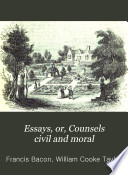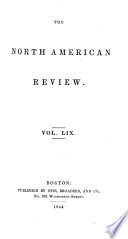 | Francis Bacon - 1838 - 894 pages
...serveth and conferreth to magnanimity, morality, and to delectation. And therefore it was ever thought to have some participation of divineness, because...pleasure, joined also with the agreement and consort it hath with music, it hath had access and estimation in rude times and barbarous regions, where other... | |
 | Henry Rogers - 1838 - 150 pages
...some satisfaction to the mind of man in those points wherein the nature of things doth deny it — to raise and erect the mind by submitting the shows of things to the desires of the mind." That it is defective, he himself virtually admits in his "De Augmentis," which was merely an... | |
 | James Douglas (of Cavers.) - 1839 - 406 pages
...serveth and conferreth to magnanimity, morality, and delectation. And therefore it was even thought to have some participation of divineness, because...it doth raise and erect the mind, by submitting the shews of things to the desires of the mind ; whereas reason doth buckle and bow the mind unto the nature... | |
 | Francis Bacon (visct. St. Albans.) - 1840 - 244 pages
...serveth and conferreth to magnanimity, morality and to delectation. And therefore it was ever thought to have some participation of divineness, because...nature and pleasure, joined also with the agreement and c,msort it hath with music, it hath had access and estimation in rude times and barbarous regions,... | |
 | David Lester Richardson - 1840 - 364 pages
...serveth and conferreth to magnanimity, morality and delectation ; and therefore it was ever thought to have some participation of divineness, because...it doth raise and erect the mind, by submitting the show3 of things to the desires of the mind ; whereas reason doth humble and bow the mind unto the nature... | |
 | David Lester Richardson - 1840 - 396 pages
...it was ever thought to have some participation of divineness, because it doth raise and erect ttie mind, by submitting the shows of things to the desires of the mind ; whereas reason doth humble and bow tlie mind unto the nature of things. — Lord iiacon. What does even the stern and severe... | |
 | 1841 - 832 pages
...serveth and confernth to magnanimity, morality, and to delectation. And, therefore, it was ever thought to have some participation of divineness, because...pleasure, joined also with the agreement and consort it hath had with music, it hath had access and estimation in rude times and barbarous regions, where... | |
 | Samuel Tyler - 1844 - 214 pages
...serveth and conferreth to magnanimity, morality and delectation. And therefore it was ever thought to have some participation of divineness, because...buckle and bow the mind unto the nature of things." This admirable delineation of the objects and nature of poetry, sounds doubtless, in the ears of those... | |
 | Jared Sparks, Edward Everett, James Russell Lowell, Henry Cabot Lodge - 1844 - 548 pages
...serveth and conferreth to magnanimity, morality, and to delectation. And, therefore, it was ever thought to have some participation of divineness, because...submitting the shows of things to the desires of the mind." Now, Wordsworth, whether he appears to sing of the past or the present, is, in reality, singing... | |
 | Royal Society of Edinburgh - 1878 - 830 pages
...— that is to say, didactic. It is with a covert sneer that he says : — " Poesy was ever thought to have some participation of divineness, because...buckle and bow the mind unto the nature of things." He divides poetry into Narrative, Representative, and Allusive. In speaking of Representative poetry... | |
| |